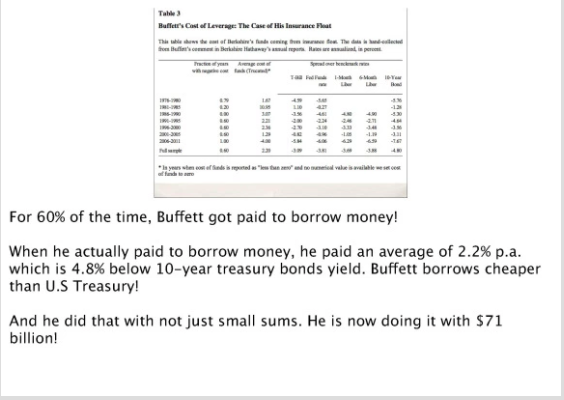What We’re Reading
Here are a few good articles the Collaborative Fund team came across this week
Discrimination
Gender discrimination in finance is now quantified:
Data show men in the financial industry are three times as likely as women to engage in misconduct: fraud, negligence, risky investments. On average, they commit errors that are 30 percent more expensive to their firms. And they’re twice as likely to offend again.
Female financial advisers and stockbrokers who perpetrate similar wrongs, however, face a greater risk of losing their jobs.
Floats and moats
This is a good presentation on the power of float:

Economies of scale
A new high-bar in the shoe sponsorship world:
LaVar Ball has a price for his sons: $1 billion.
The father of UCLA guard Lonzo Ball and his brothers LiAngelo and LaMelo, high schoolers who also are committed to the Bruins, said he’s looking for a packaged shoe deal involving his three sons that would be worth $1 billion.
“A billion dollars, it has to be there,” Ball told USA Today in an article published Monday. “That’s our number, a billion, straight out of the gate. And you don’t even have to give it to me all up front. Give us $100 million a year.”
Makes sense
Jared Diamond says science needs to embrace more common sense:
You’re much more likely to hear “common sense” invoked as a concept at a cocktail party than at a scientific discussion. In fact, common sense should be invoked more often in scientific discussions, where it is sometimes deficient and scorned. Scientists may string out a detailed argument that reaches an implausible conclusion contradicting common sense. But many other scientists nevertheless accept the implausible conclusion, because they get caught up in the details of the argument.
Blunt wisdom
Here’s a list of 22 short videos of Charlie Munger answering questions about investing and life. One sample:
Diversity
A look at who’s responsible for entrepreneurship in America:
Immigrants today are more than twice as likely to found businesses as their native-born counterparts and are responsible for more than25% of all new business creation and related job growth. And while some of these immigrant-led businesses are next-generation startups and small businesses, many actually top the charts when it comes to America’s largest companies. Currently,more than 40 percent of Fortune 500 companieswere founded by immigrants or the children of immigrants, according to a study byThe Partnership for a New American Economy.
Have a good weekend.